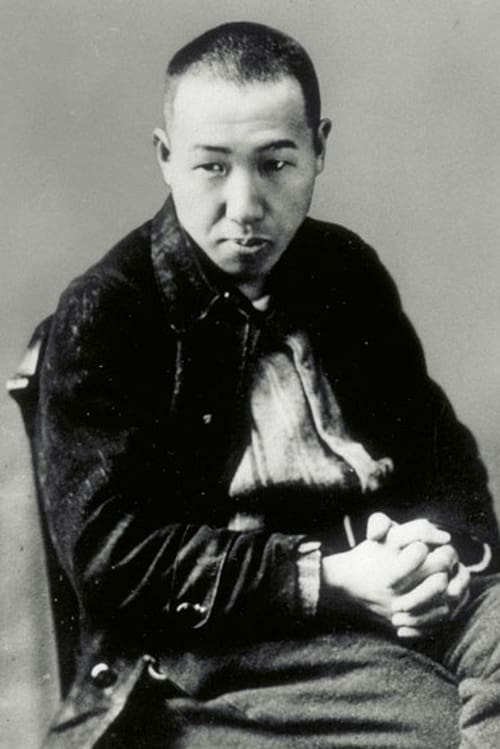Kenji Miyazawa
Nascimento : 1896-08-27, Hanamaki, Iwate Prefecture, Japan
Morte : 1933-09-21
História
Kenji Miyazawa was a poet and author of novelist in early Showa period Japan. Many of his children's works, that appear superficially to be light or humorous, contain stories intended for moral education of the reader.
A number of his children's stories have been adapted into animated movies in Japan.

Book
A hunter who lives in the mountain knows the bears well. She apologizes to each bear every time she kills one, but she has to, for it is how she makes her living. One evening, she comes across a bear and when she is about to kill it, the bear speaks to her.
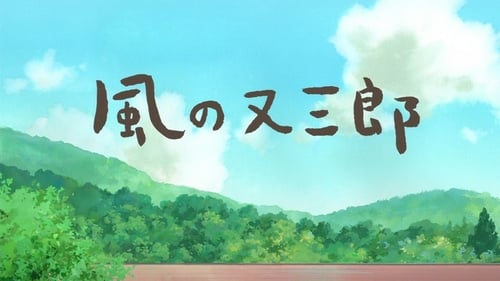
Creator
Takada, uma jovem rapariga mudou-se para outra cidade e inscreveu-se numa nova escola, devido ao trabalho do seu pai.
Os seus novos colegas de turma sentem que há algo de errado com ela. Pensam que ela tem poderes divinos do Deus do Vento, fazendo desaparecer telhados, árvores e outros objetos com rajadas de vento.
Kouichi, o único humano na turma, não tem medo dela e tenta que conviver e dar-se bem com ela, mesmo que os restantes colegas estejam amedrontados.
Será o início de uma amizade, mas não sabemos se irá perdurar.

Original Story
The stars in the sky seem to maintain the remote, eternal order which earthbound souls can hardly hope to attain, as it would take exceptional energy to transform oneself from an earthly creature into a brightly shining star. However, the ugly nighthawk who had experienced great hardship being despised by fellow birds managed to convert that hardship into enormous energy to fly up to heaven, and in the end could glow as the nighthawk star. A short made by Ryu Kato celebrating Kenji Miyazawa's 80+ years of fairy tales based on the story of the same name. (Source: The World of Kenji Miyazawa)

Novel
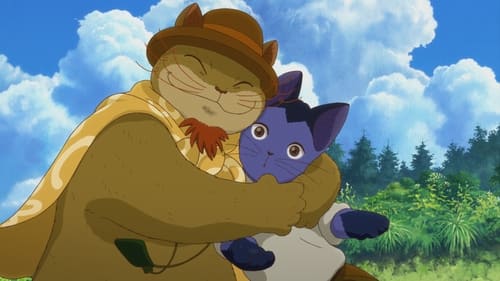
Novel
conto de fadas segue um jovem chamado Guskou nas florestas Tohoku do nordeste do Japão na década de 1920. Depois de um ataque de secas e desastres naturais, Guskou é forçado a deixar sua casa e procurar uma vida melhor em outro lugar. Guskou se junta a um grupo de cientistas do Departamento Ihatov Volcano , que lida com os mesmos desastres naturais que levaram Guskou de sua casa.

Poem
Having abandoned modern civilization, Ryoichi lives an isolated, self-sufficient life on a snow-covered mountain and sends mail bombs to the CEOs of corporations and TV networks. One day, he encounters a mysterious creature in the forest. That night, his older brother, who had committed suicide, appears before him at his cabin. The apparition takes Ryoichi beyond a door, where Ryoichi learns the truth about his family.

Poem
Steel-worker Saito Tetsuo, driven by an unexplained anxiety, steals bike after bike to move away from his hometown to Tokyo. Through snow-storms and empty landscapes, the breathtaking photography allows us to look deep into the mindscape of a man searching for an answer - although the question itself is never quite articulated.
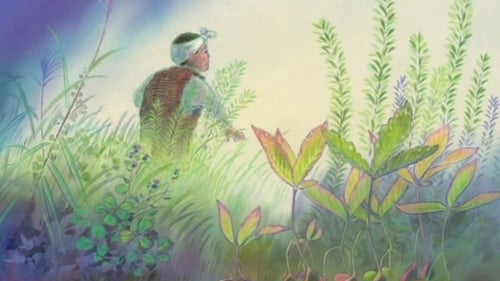
Lyricist
The Night of Taneyamagahara is an anime short film directed by Kazuo Oga and released by Studio Ghibli. A DVD version was released for Japan on July 7, 2006.

Author
The Night of Taneyamagahara is an anime short film directed by Kazuo Oga and released by Studio Ghibli. A DVD version was released for Japan on July 7, 2006.

Original Story
Welcome aboard the fantasy train in the stars! "Fantasy Railroad in the Stars" is a fantastic journey of a boy, Giovanni, in a dreamscape created into a colourful full-dome CG animation picture with inspiring background music. Based on the famous Ginga Tetsudou no Yoru story written by Kenji Miyazawa in the early 20th century, Kagaya, a digital fine artist, has breathed new life into the unique imaginary world using creativity and precise astronomical knowledge. The starry sky is depicted as the Celestial Field made up of a river, a field of silver grasses, flowers, birds, survey towers, railway signals and more. Across this amazing beautiful scenery, the Celestial Railroad runs along the Milky Way. It is a fantasy world in full colour, but designed with scientific accuracy.

Writer
Based on the story by Kenji Miyazawa in which two hunters get lost in the woods and discover a strange restaurant which makes a number of increasingly strenuous demands.

Original Story
Claymation adaptation of Kenji Miyazawa's short tale about a pair of hunters that, after getting lost on the mountains, find themselves looking for a meal at the mysterious Wildcat House restaurant. Faced with endless corridors and doors, and many signs asking them to do a series of confusing actions, the gentlemen start questioning what kind of place the restaurant might actually be behind all these doors.

Writer
Set in the beginning of the 20th century Japan, the film follows the bright and eccentric Kenji from his late student years through his adulthood. Kenji suffers the tragedy of being an artist whose art isn't recognized during his lifetime. Based on the life of the author Kenji Miyazawa, the film depicts his brief but intense existence.

Director
A short anime based on Kenji Miyazawa's fairytale "Twin Stars" where Chunse Doji and Boze Doji live in the Milky Way.

Novel
O conto de fadas segue um jovem chamado Guskou nas florestas Tohoku do nordeste do Japão na década de 1920. Depois de um ataque de secas e desastres naturais, Guskou é forçado a deixar sua casa e procurar uma vida melhor em outro lugar. Guskou se junta a um grupo de cientistas do Departamento Ihatov Volcano , que lida com os mesmos desastres naturais que levaram Guskou de sua casa.

Original Story
A short film based on a story by Japanese writer Kenji Miyazawa in which two young British hunters get lost in the woods and discover a strange restaurant. Are the hunters about to discover how it feels to be hunted?

Novel
Karin has lived alone in a secluded mountain village with her consumptive mother since her father died. Her worried grandfather advises her to send her mother to a sanatorium and be adopted by him, although she refuses to accept. On the Buddhist All Soul’s Day Festival in August, a messenger from her grandfather pays a sudden visit to her house.

Author
The Acorns and the Wildcat is a unique short film in picture-book format from the creator of Night on the Galactic Railroad and Gauche the Cellist. Unusually for an anime, a narrator reads Kenji's story aloud while the action is played out on the screen by a succession of warm and evocative illustrations brought to life by subtle touches of animation. If the film feels somehow familiar yet you can't put your finger on the reason why, it's probably the sumptuously minimalist animation by Yasuhiro Nagura, who was the animation director of Mamoru Oshii's artsy 1986 feature Angel's Egg. That, and Kenji's wildcat is said to have been the inspiration for Miyazaki's Panda/Totoro creature. The idea of reading Kenji's story aloud instead of playing it out as a drama is quite refreshing, and Kenji's magical language and narrative style are entirely sufficient to sustain interest. Combined with the spacey music and breathtaking art, the result is a pleasantly unassuming little gem of a film.

Author
A foreign transfer student from the city arrives one day in a Japanese country town. Enchanted by his air of mystery, his classmates nickname him "Matasaburou the Wind Imp" after a local legend. Eventually they become friends and spend many days playing in the countryside. One windy day, Matasaburou returns to the city, leaving his classmates to speculate that he really was Matasaburou the Wind Imp and that he flew away on the wind.
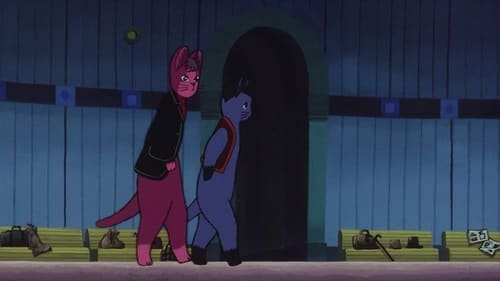
Novel
Giovanni é um garoto solitário de uma pequena cidade da colina, que ao ir buscar leite para sua mãe doente no dia do Festival Das Estrelas, encontra-se atravessando a Via Láctea em um trem a vapor mais rápido do que a luz com seu único amigo, Campanella. As estações que visitam em várias constelações, como os planetas explorados por St. Exupery em o "Pequeno Príncipe", oferecem aventuras curiosas e uma variedade de "tipos" humanos. Realidade e fantasia se chocam a bordo do trem e em suas suas viagens através dos anos-luz, por vezes, sugere a jornada pela vida. A história é contada em um ritmo lento, fazendo-o divagar em uma viagem de sonhos através do espaço e do tempo.
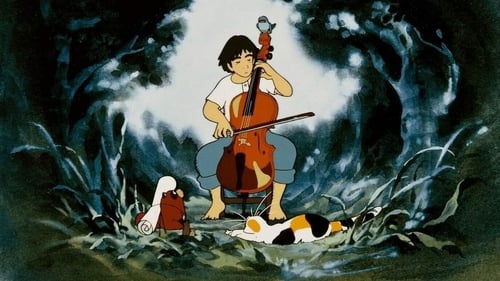
Author
Gauche é um violoncelista profissional. Durante os ensaios para uma apresentação, ele é repreendido pelo maestro porque sua música não é boa o suficiente. Seu tempo está acabando e ele parece não ter "sensação" para a música. Gauche retorna à sua casa no interior sozinho e começa a praticar. Em seguida, um gato tenta o fazer compreender o significado profundo da música. A importância da prática é demonstrada por um cuco, o ritmo por um texugo e a ternura por um rato. Em quatro dias ele aprende o verdadeiro significado e está pronto para a sua apresentação.

Short Story
Gauche é um violoncelista profissional. Durante os ensaios para uma apresentação, ele é repreendido pelo maestro porque sua música não é boa o suficiente. Seu tempo está acabando e ele parece não ter "sensação" para a música. Gauche retorna à sua casa no interior sozinho e começa a praticar. Em seguida, um gato tenta o fazer compreender o significado profundo da música. A importância da prática é demonstrada por um cuco, o ritmo por um texugo e a ternura por um rato. Em quatro dias ele aprende o verdadeiro significado e está pronto para a sua apresentação.

Writer
A Miyazawa Kenji story adapted as a puppet animation from Gakken in 1963

Writer
Based on the story by Kenji Miyazawa in which two hunters get lost in the woods and discover a strange restaurant which makes a number of increasingly strenuous demands.

Novel
Saburō Takada transfers from a city to a very small school. The village children suspect that Saburō is actually Matasaburō, the wind sprite.

Writer
A young prince and a minister's son go on a quest to find the greatest jewel the world has ever seen. An adaptation of Kenji Miyazawa's short story with the same title.
